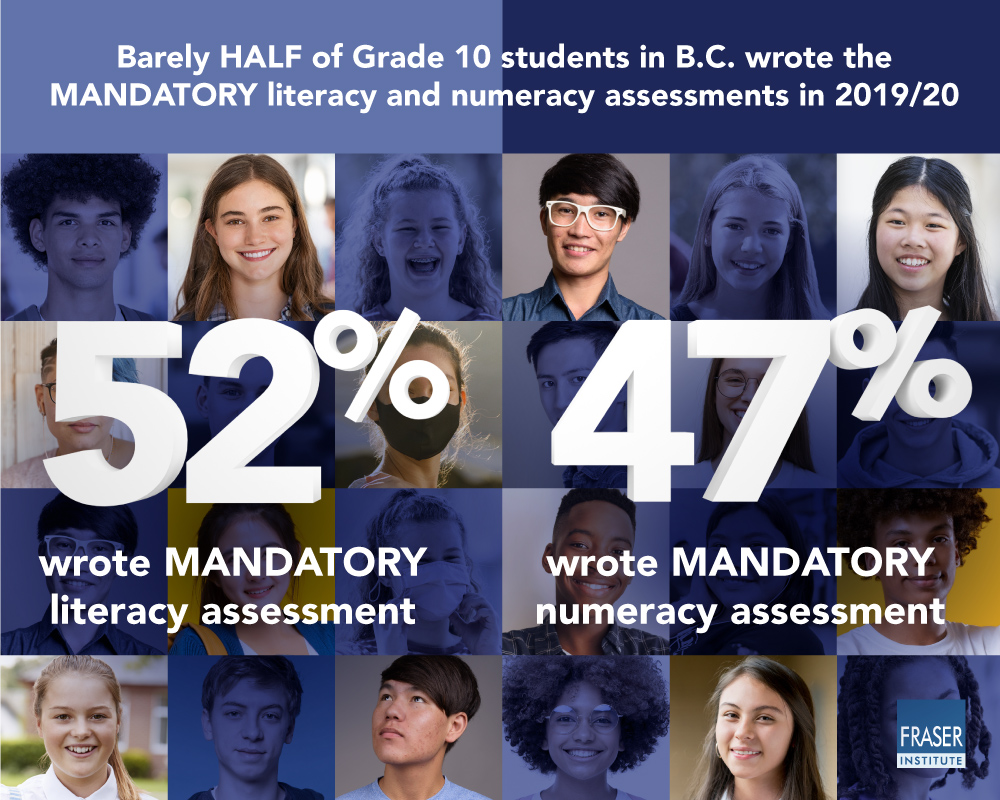Study
| EST. READ TIME 1 MIN.Only about half of B.C.’s grade 10 students wrote mandatory student assessments in 2019/20, with majority not proficient in numeracy
Worrying Trends in BC’s Testing of Grade 10 Students
Summary
- Only 52 percent of BC grade 10 students completed the grade 10 Literacy Assessment in 2019/20.
- Only 47 percent of BC grade 10 students completed the grade 10 Numeracy Assessment in 2019/20.
- Of those students who completed the grade 10 Literacy Assessment, 74 percent were proficient or above.
- Of those students who completed the grade 10 Numeracy Assessment, only 40 percent were proficient or above.
- Only 17 schools saw 90 percent or more students complete the grade 10 Literacy and Numeracy Assessments.
- COVID-19 related school closures, a push from the BC Teachers Federation for parents to pull their children from standardized testing, and a significant change to the nature of student testing in BC may have all contributed to the gap in testing data.

Share
-

Paige MacPherson
Associate Director, Education Policy
Paige MacPherson is Associate Director of Education Policy for the Fraser Institute. For many years, Paige has contributed policy analysisand commentary to major media outlets and research organizations across Canada, focusing on education policy, fiscal policy and government accountability. She holds a Master of Public Policy from the University of Calgary School of Public Policy and a BA from Dalhousie University. Prior to joining the Fraser Institute, Paige was Alberta Director and Atlantic Director for the Canadian Taxpayers Federation, TV host and politics reporter with Sun Media and provided communications for the Atlantic Institute for Market Studies, where she founded a post-secondary student outreach program. Paige’s work has taken her from coast-to-coast-to-coast.… Read more Read Less… -

Joel Emes
Senior Economist, Fraser InstituteJoel Emes is a Senior Economist, Addington Centre for Measurement, at the Fraser Institute. Joel started his career with theFraser Institute and rejoined after a stint as a senior analyst, acting executive director and then senior advisor to British Columbia’s provincial government. Joel initiated and led several flagship projects in the areas of tax freedom and government performance, spending, debt, and unfunded liabilities. He supports many projects at the Institute in areas such as investment, equalization, school performance and fiscal policy. Joel holds a B.A. and an M.A. in economics from Simon Fraser University.… Read more Read Less…
Related Topics
Related Articles
Parents in every province—not just Alberta—deserve as much school choice as possible
By: Michael Zwaagstra
Clock ticking on B.C. government’s debt bomb
By: Ben Eisen
Broken ‘equalization’ program bad for all provinces
By: Alex Whalen and Tegan Hill